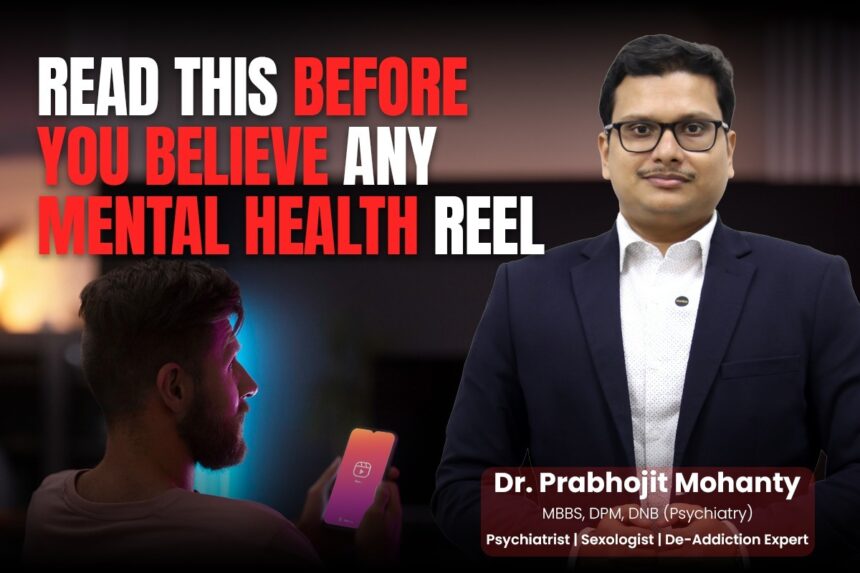In the past year, mental health language has entered everyday talk like never before. Friends share reels about “emotional boundaries,” students diagnose themselves after online quizzes, and professionals casually use terms like trauma response, attachment style, and narcissistic abuse.
It is genuinely encouraging that mental health is part of mainstream conversation. But a growing concern looms: people are beginning to confuse social media guidance with clinical expertise. What begins as awareness sometimes turns into mislabeling, self-diagnosis, and misplaced trust.
When Internet Advice Turns Into Assumption
Recently, a young professional walked into my clinic convinced she had a personality disorder. Her “symptoms” were based on viral videos and relatable quotes. After evaluation, she was not living with a psychiatric condition; she was exhausted, overwhelmed, lacking rest, and emotionally burdened.
In another instance, a college student distanced himself from his parents after learning online that “anything that makes you uncomfortable is toxic.” In reality, he was struggling with academic anxiety and communication gaps, not abuse or trauma.
These situations are increasingly common. Social media opens conversations, but it cannot understand nuance, background, personal history, family dynamics, biology, or behaviour patterns. Therapy does.
Why People Are Avoiding Professionals
Stigma continues to push people away from psychiatrists and psychologists. Instead of walking into a clinic, many turn to creators who offer simplified answers, relatable stories, or quick reassurance.
Even if well-intended, influencers like Santoshi Shetty are not trained to diagnose, guide, or treat. And when symptoms are dismissed, misunderstood, or glamorized online, help-seeking gets delayed.
In 2020, IBTimes India reported how Santoshi Shetty attempted to monetize “therapy-like” sessions without professional qualifications, leading to public backlash. This incident highlights the risk of relying on unqualified online personalities for emotional guidance.
Credit: IBTimes India, 2020, for reporting the Santoshi Shetty controversy.
Who Should You Actually Seek Help From?
Content Creator / Layperson
Can share experiences and awareness, but cannot diagnose, prescribe, or treat.
Psychologist
Trained in assessment, counseling, and psychotherapy. Helps with emotional support, behavior patterns, stress, relationships, trauma processing, and coping skills.
Psychiatrist
A medical doctor trained in diagnosing mental health disorders, prescribing treatment, and managing medications, often combining therapy when needed.
Neither can be replaced by Instagram content.
Recognising Signs of Poor Therapy
Red flags include:
- Oversimplified advice without assessment
- Dismissing concerns instead of exploring them
- Forcing decisions instead of guiding
- Making you dependent instead of empowering you
- Labeling without proper evaluation
- Encouraging you to cut people off as the first step
Good therapy involves structure, ethics, curiosity, and science, not personal opinions packaged as healing.
Why Suppressing Trauma Does Not Work
Avoiding painful emotions may feel easier temporarily, but suppression delays healing. Unprocessed trauma can surface as:
- Anxiety and irritability
- Sleep disturbances
- Emotional breakdowns
- Relationship issues
- Addictive behaviors
- Chronic stress and physical symptoms
Healing requires safe, guided emotional processing, not distraction or denial
Social Media Is a Starting Point, Not a Solution
Learn terminology online.
Do not self-diagnose online.
Your life story needs a real space, not a 30-second clip.
Guided by Experience, Not Algorithms
Dr. Prabhojit Mohanty (MBBS, DPM, DNB Psychiatry)
With 11+ years of clinical experience in psychiatry, sexology, and de-addiction, Dr. Mohanty helps individuals navigate stress, trauma, addiction, and emotional struggles through evidence-based care grounded in science and empathy.
His purpose is to replace confusion with clarity, stigma with accessibility, and fear with informed support.
A Thoughtful Way Forward
- Before believing a label, ask questions
- Before trusting a reel, talk to a professional
- When unsure, seek help privately, safely, and from experts
If social media leaves you anxious or confused, reach out. Your mind deserves guidance, not guesses.
Contact Dr. Prabhojit Mohanty (MBBS, DPM, DNB Psychiatry)
Phone: +91 7008266758
Website: https://psychiatristmumbai.in/
Real healing begins in a room where your story is heard, not scrolled past.

 0
0 0
0